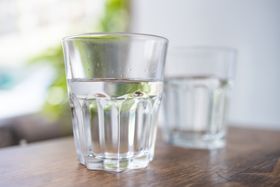4 Best Electrolytes for Seniors for Optimal Hydration Support
Thirsty for a long and healthy life? Here's why staying hydrated is crucial for older adults, and how you can easily keep their body happy and healthy.
Updated August 15, 2025

Staying hydrated is crucial for everyone, but especially for seniors. For many, using specially formulated electrolyte drinks for the elderly can make hydration easier and more effective. As we age, our bodies struggle to manage fluids and electrolytes effectively.
This change can lead to health problems, from muscle cramps and fatigue to confusion and even heart issues. Luckily, this list of the best electrolytes for the elderly offers an easy solution to boost hydration.
Our 4 Best Electrolytes for Seniors
- Best overall electrolytes for seniors: MAYU Electrolyte Drops
- Best electrolytes for mild flavor: HiLyte Electrolyte
- Best electrolytes for active seniors: Dr. Berg Electrolyte Powder
- Best electrolytes for convenience: HydraLyte Fizzy Electrolyte Powder
Why Seniors Need Electrolytes?
Electrolytes are minerals like sodium, potassium, and magnesium that conduct electrical impulses throughout our bodies, supporting everything from nerve function to muscle contractions. These include:
- Regulate fluid balance: They ensure proper hydration, preventing issues like fatigue, constipation, and even confusion.
- Support bodily functions: Electrolytes contribute to muscle function, nerve impulses, and heart rhythm, impacting overall health and well-being.
- Age-related challenges: Seniors might experience reduced thirst sensation and increased risk of dehydration due to medication or mobility issues.
4 Best Electrolytes for the Elderly
Signs of Dehydration and Electrolyte Imbalance
- Fatigue, lightheadedness, and confusion.
- Muscle cramps, irregular heartbeats, and cognitive issues.
- Joint pain, dry mouth, and urinary tract infections.
Optimal Hydration for Seniors
Seniors face unique challenges in staying hydrated and balanced. Electrolyte products like MAYU Essentials | Electrolyte Drops offer a convenient way to replenish essential minerals, supporting energy, hydration, and overall well-being. Remember, small steps bring significant benefits for a healthier, happier you.
FAQs
How to treat electrolyte imbalance in the elderly?
Electrolyte imbalances in the elderly can be caused by various factors, such as medications, underlying health conditions, and decreased thirst sensation.
Recognizing the signs, including confusion, fatigue, muscle weakness, and irregular heartbeat, is crucial.
Treatment focuses on addressing the root cause and correcting the specific imbalance.
- For mild cases, increasing fluid intake, adjusting diet to include electrolyte-rich foods, and monitoring medication side effects may suffice.
- In severe cases, intravenous fluids and close monitoring in a hospital setting may be necessary.
Always consult a doctor for a proper diagnosis and a tailored treatment plan. Regular checkups and maintaining a healthy lifestyle can help prevent imbalances.
Should seniors drink electrolytes daily?
Not necessarily. While electrolytes are crucial for hydration and bodily functions, most seniors can obtain sufficient amounts through a balanced diet. However, certain situations may warrant increased electrolyte intake:
- During hot weather: Seniors are more susceptible to dehydration in heat.
- After intense exercise: Replenishing lost electrolytes is important.
- When experiencing vomiting or diarrhea: These can deplete electrolytes.
- If taking certain medications: Some medications can affect electrolyte balance.
Consult a doctor to assess individual needs and determine if electrolyte supplementation is necessary.
How much water should a 90 year old drink daily?
While individual needs vary, a general guideline for a 90-year-old is to aim for at least 6-8 cups (48-64 ounces) of fluids daily. This includes water, juice, milk, and even water-rich fruits and vegetables.
But, it's crucial to consult a doctor for personalized advice considering any health conditions or medications.
Which electrolyte imbalance is most common in elderly people?
The most common electrolyte imbalances in elderly people are dysnatremias, which involve abnormal sodium levels in the blood. This includes:
- Hyponatremia: Low sodium levels, often caused by factors like diuretics, kidney problems, or excessive water intake.
- Hypernatremia: High sodium levels, often linked to dehydration, inadequate fluid intake, or conditions like diabetes.
These imbalances can have serious consequences, including confusion, falls, and hospitalization. Regular monitoring and prompt treatment are essential.
How do you fix low sodium in the elderly?
Low sodium in the elderly (hyponatremia) is treated by first identifying its cause, which could be medications, underlying conditions, or excessive water intake. Doctors may adjust medications, treat underlying illnesses, or recommend reducing fluid intake.
Increasing sodium intake through diet, oral rehydration solutions, or medication may also be necessary.
Severe cases require hospitalization and intravenous sodium administration. Always consult a doctor for diagnosis and treatment.
Disclaimer: The information published by MAYU Water is not a substitute for the expert knowledge, advice, and recommendations of trained professionals. We strongly recommend consulting with industry experts and primary or scientific sources before making any health, research-related, or other important decisions.












































